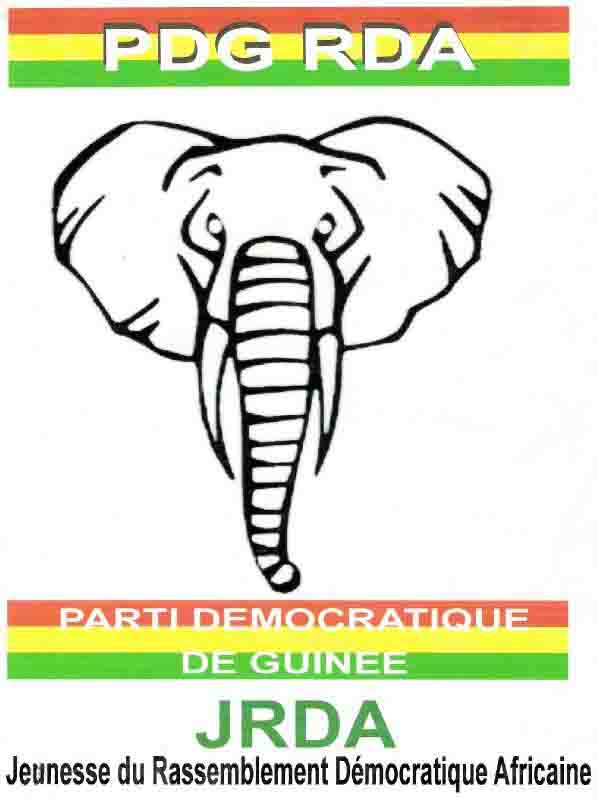|
Two rare and unreleased Bembeya
Jazz National songs featuring Demba Camara!
During
Guinea’s 1st republic, President Sékou Touré created
many state enterprises that oversaw the development of local
arts and culture. These included Syliphone (music), Syli-Cinema
(film) and Syli-Photo (photography). The "syli" in these
names is taken from the local Susoxi
word for elephant, as the elephant was the emblem of Guinea’s sole
political party of the era, the Parti Démocratique de Guinée
(PDG), who led the nation from independence in 1958 until
Touré’s death in 1984. The symbolism and use of the “syli” became so enmeshed and
pervasive in public life during this era that the
nation’s currency was re-named as the Syli, the public smoked Syli cigarettes,
which they lit with Syli matches.
 |
-
Syliphone is the most well-known of these state-run cultural
entities. One can also still buy old postcards which feature
photographs from Syli-Photo. Syli-Cinema, which released
dozens of documentaries and films from the early 1960s, is
perhaps the least known, as many of its films and documentaries are now lost.
Some were destroyed when the Radio Télévision Guinée
buildings were bombed in 1985, others were obliterated during the
post-Touré era purges, with others lost due to poor archival
infrastructures.
-
“Hafia triple champion d'Afrique” is a Syli-Cinema documentary from 1978 which features
Guinea’s national football team, Hafia, the “triple champions” of
the Africa Cup. Directed by Moussa Diakité Kémoko, the documentary
features unique footage of the celebrations of the football team's
victories and a soundtrack which contains a snippet of
“Pont l’amitie”, an unreleased Bembeya Jazz National song featuring
Demba Camara on vocals.
I have annotated the documentary, below, to include timings
and performers:
-
The
“Hafia triple champion d'Afrique,” documentary celebrated Guinea’s third African Cup title and
commences with highlights from their 1977 match including a stunning
goal for Guinea at 5’49”. President Sékou Touré delivers a speech
after the match.-
- The match celebrations and music begin at 7'04" when a cavalcade
of musicians, dancers, acrobats and motorcycle-police-stuntmen put
on a show at the football stadium. The soundtrack to the footage is Diely Fodé Diabaté performing
the song “Hafia Football
Club – Triple Champion d'Afrique”.
- - At
7'15" we see an all-female orchestra in the parade which
is likely Les Amazones de Guinée. As Guinea had at least two
all-female orchestras, however, it could also be the Orchestre Feminin de
Mamou.
- At 8'53" the post-match soirée commences and we hear
Demba Camara and Bembeya Jazz National performing “Pont l’amitie”,
unreleased on Syliphone, with Sékou Diabaté on slide guitar. (Links
to the full versions of the song are below).
- At 11'09" we hear Keletigui et ses Tambourinis
performing a live version of “Temedi” (a
wonderful studio clip of it is here).
- Unfortunately I can’t recognise the orchestra who
appears at 11'13" – is that Kerfala Camara on the right? If it is
then the orchestra is Keletigui et ses Tambourinis, especially as
“Temedi” is dubbed over the footage, however I am not certain.
- At 12'43" we hear Kemo(ko) Kouyaté, the rhythm
guitarist from Balla et ses Balladins, who later joined Myriam
Makeba’s Quintette Guinéenne, and then it’s back to “Temedi” by
Keletigui.
- At 14'14" we again hear Kemo(ko) Kouyaté, and at 14'27" we hear Kouyaté Sory Kandia & l’Ensemble Instrumental de la
Voix de la Revolution who perform “Hafia”, which concludes the
documentary.
-
“Pont
l’amitie” was recorded by Bembeya Jazz National in circa 1971, which
is my estimate based upon on
“Alalaké” and "Wouloukoro", two other Bembeya Jazz songs that feature
Sékou Diabaté’s slide guitar. I archived “Pont l’amitie” for the
Endangered Archives Programme as
part of three sound archive projects (“Syliphone
- an early recording label from Guinea”), and from these I digitised two
versions of the song:
Pont
l’amitie (1)
Pont
l'amitie (2)
Initially I thought the (longer) 2nd version was the best of the two
recordings, given Sékou Diabaté’s solo, and the segue is smoother,
but the overall mix is better in the first version, especially the
brass sections. Its dueling horn sections (saxes & trumpets) towards the end
of the song remind me a lot of Franco et le TPOK Jazz’s recordings
(e.g. “Liberté),
who employed the same technique, and of course it is a style common in
Cuban orchestras, who influenced the globe and Africa’s popular music from the west coast to the east.
|
**Attention**!
|
If you
share the two versions of “Pont l’amitie” by Bembeya Jazz
National then ensure that you link to the songs at the British
Library Sound archive website via the links provided above. Do
not release the songs or upload the songs onto Facebook, YouTube
or similar. The British Library is the legal depository of the
songs and if you copy them or share them without due
acknowledgement and prior agreement with The British Library and
with the copyright holders, you will be breaking copyright law.
The British Library is the legal depository of the two versions
of “Pont l’amitie” by Bembeya Jazz National and its website
clearly states that it is prohibited “to transmit or re-circulate any material
obtained from the [The British Library] Website to any third
party except where expressly permitted on the Website”. See
https://www.bl.uk/.../terms.../websites-and-online-services
for further information.
|
|
|
|
Hafia triple champion d'Afrique (Syli-Cinema 1978) |
 |
|
At 8'53"
Demba Camara and Bembeya Jazz National perform “Pont l’amitie” |
|

